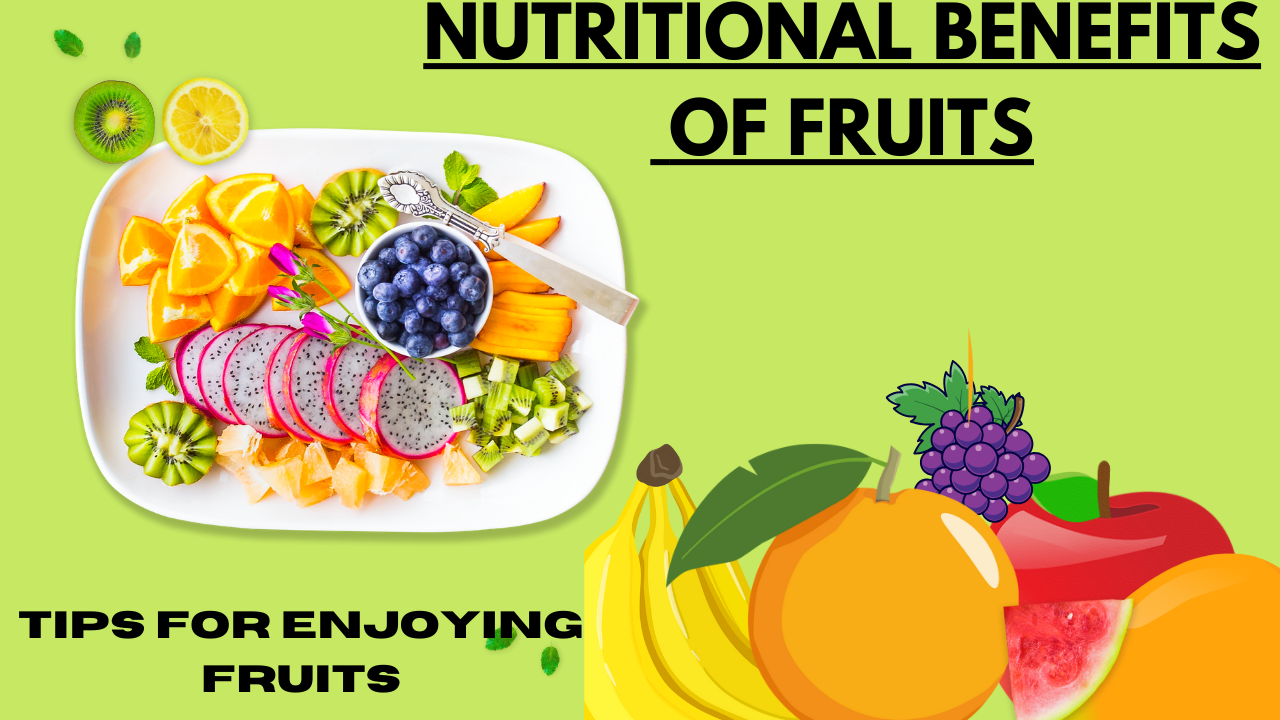Power of Fruit: A Key Constituent of Healthy Nutrition
Fruits are some of the healthiest foods to consume. They contain the body’s essential vitamins, minerals, antioxidants, and fiber that contribute to good health. The health benefits offered by fruits in the context of healthy and balanced nutrition include better immune system, digestive health, and heart health. Whether eaten fresh, frozen, dried, or juiced, making a wide variety of fruits a part of your daily meals can benefit your health in many ways. Let’s take a look at the role of fruit in a healthy diet and how to make the most of it.
1.Nutritional Benefits of Fruits
Power of Fruit: A Key Constituent of Healthy Nutrition
Fruits are some of the healthiest foods to consume. They contain the body’s essential vitamins, minerals, antioxidants, and fiber that contribute to good health. The health benefits offered by fruits in the context of healthy and balanced nutrition include better immune system, digestive health, and heart health. Whether eaten fresh, frozen, dried, or juiced, making a wide variety of fruits a part of your daily meals can benefit your health in many ways. Let’s take a look at the role of fruit in a healthy diet and how to make the most of it.
Nutritional Benefits of Fruit Rich in Vitamins and Minerals Fruit is a good source of all the vitamins: Vitamin C, Vitamin A, folate, along with potassium and magnesium. The vitamin which can be readily obtained through fruit is Vitamin C: citrus oranges and strawberries contain it. Vitamin C serves as a significant component to your immune functions and even skin care. The other vitamin – Vitamin A, which is accumulated mostly in fruits like mangoes and apricots, assists in eye-related functions, along with the functions of your immune system. Potassium is contained in bananas, avocados, and citrus fruits and protects against hypotension and fluid imbalances in the body.
High in Fiber Fiber is an essential nutrient for digestive health. Many fruits contain both soluble and insoluble fiber, which are used in digestive health, and some fruits can be good for digestive health, preventing constipation and helping in a healthy weight by providing feelings of satiety. Fruit supports healthy cholesterol and helps level blood sugar and, thus, is the best for those managing their diabetes.
Antioxidant-Filled Fruits These are full of antioxidants that fight the oxidation stress within your body. The free radicals causing chronic conditions, such as heart problems and cancer, are neutralized and destroyed. Thus, having antioxidant-rich fruits is key to protecting your body against these diseases. Among others, blueberries, raspberries, and blackberries have more antioxidants, with which they prevent inflammation, among other cellular damages.
Hydration Most fruits are very moist with a high percentage of water, which means they are able to help keep one hydrated. Especially hydrating fruits include watermelon, cucumbers, oranges, and strawberries. Fruits are known to have many hydrating effects as hydration is needed for a healthy skin and body regulation for bodily functions.
Low in Calories Most fruits are naturally low in calories, making them the best choice for people trying to control their weight. Since they are nutrient-dense, you get a lot of important vitamins and minerals without overloading on calories. Such fruits as watermelon, grapes, and apples satisfy you and can be used as a healthier alternative for calorie-laden snacks and sweets.
2.The Role of Fruit in Preventing Chronic Diseases
Heart Health: Frequent intake of fruits such as citrus fruits, berries, and apples can help improve heart health. These fruits contain fiber, antioxidants, and potassium that reduce cholesterol levels, blood pressure, and risks of heart disease.
Being fuller for longer since it is packed with fiber and water; fruits are, by natural design, filling and unlikely to lead to over-eating. The snack between meals or fruits will be able to help in the management of weight management as well as prevent unhealthy snacking.
Diabetes Prevention: Many fruits, especially those with a low glycemic index, such as berries, apples, and pears, help to regulate blood sugar. Fiber in fruits slows the absorption of sugar, prevents spiking of blood sugar, and thus manages diabetes.
Fiber in fruits aids in digestion and prevents constipation. It also nourishes the beneficial bacteria in your gut, which is an important factor in maintaining healthy gut microbiota.
3.How to increase your fruit intake
Start Your Day with Fresh Fruit Add fresh fruit to your breakfast. It is easy and tasty to boost nutrient intake by topping oatmeal, yogurt, or smoothies with fresh fruit. Or have a piece of whole fruit on the side. A fruit-based smoothie using ingredients such as berries, spinach, and almond milk is an excellent choice for a nutrient-dense breakfast.
Snack on Fruit Instead of reaching for processed snacks, grab a piece of fruit for a healthy snack. Apples, bananas, grapes, and oranges are portable and require no preparation. Keep a bowl of fresh fruit at home or work for a convenient snack option that provides natural energy and nutrients.
Add Fruit to Salads Fresh fruits can be added to salads for their natural sweetness and texture. Try adding berries, citrus slices, or apples to your green salads. For a tropical twist, include mangoes, pineapples, or avocado. A fruit salad with a variety of colorful fruits can also be a refreshing side dish.
4.Incorporate Fruit into Desserts
Fruits are excellent and healthy alternatives to sugary desserts. Enjoy them on their own or with a drizzle of honey and sprinkling of cinnamon for extra flavor. Consider making a fruit salad, baked apples, or blending frozen fruits into a creamy sorbet for naturally sweet treat.
Cook with Fruit One other way to include fruit is to cook with it. Add fruit to your stir-fries, grain bowls, or even grilled meats for a unique flavor profile. Apples, pears, and peaches pair beautifully with roasted vegetables or grilled chicken, while citrus fruits add a tangy zest to sauces and marinades.
5.Tips for Enjoying Fruit
Use Fresh in Season and Local Fruits: Get the best flavor and the most nutritional value with seasonal fruits. Locally purchased fruits are fresher, and they cost less and taste better, meaning healthy benefits too.
Balancing your Fruit intake: This is the other crucial nutrient constituent of the healthy diet. Fruit however must be consumed in moderation. Ensure the fruit consumption and also couple the intake of fruit with other nutrient dense food intake, which will also involve lean protein as well as whole grain.
Portion the Size: Though fruits, mostly fruit itself are naturally low in calories, remember, portion sizes are relevant as well. Dried fruit can be especially calorie-laden. For the most part, choose whole fruit for as much of your intake, then aim to have approximately 2-3 fruit portions per day.
END
Fruits are an essential part of a healthy diet, providing many benefits for your body. Fruit, full of the needed vitamins and minerals, fiber, and antioxidants, supports heart health and digestive health, significantly contributing to general well-being. Whether fresh, frozen, or even dried, a balanced combination of fruits in your daily diet will keep you feeling healthy, energetic, and disease-free.




